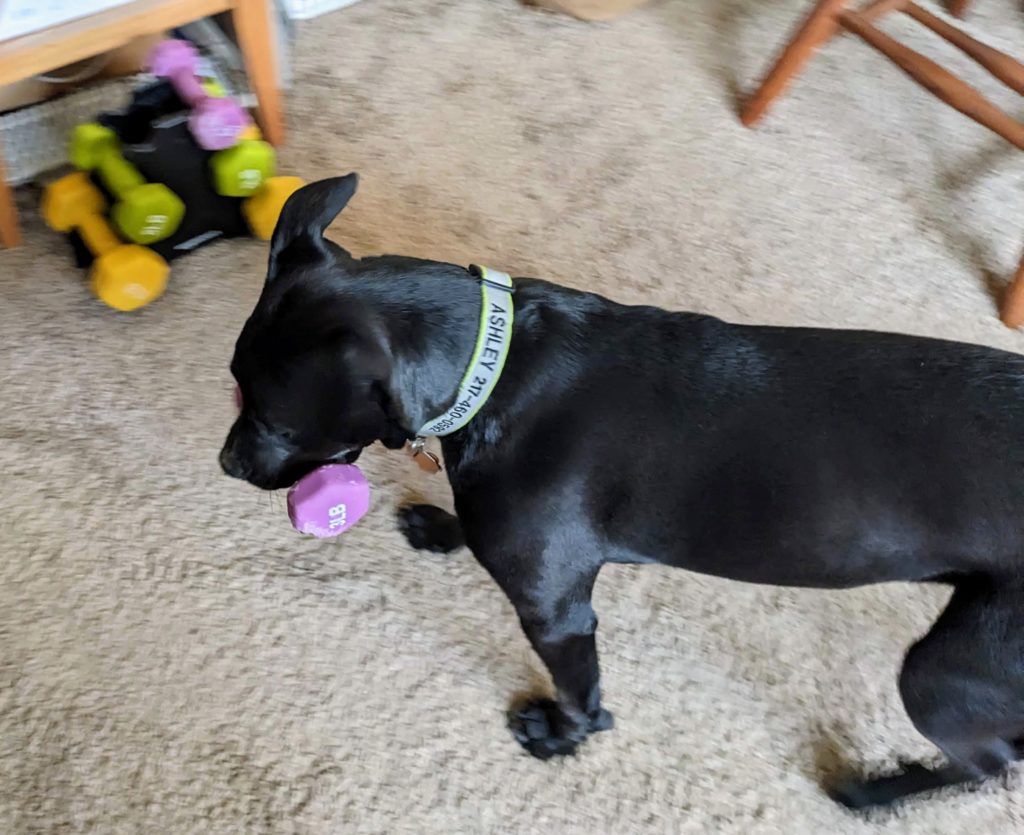Ashley emphasizing the importance of weighted carries for optimizing overall fitness. 🐕 🏋️ #dogsofmastodon


Ashley emphasizing the importance of weighted carries for optimizing overall fitness. 🐕 🏋️ #dogsofmastodon

I often describe myself as having an inclination to try and optimize things. I have observed in the past that I tend to bring this inclination to bear particularly on the unimportant stuff, which always seemed odd. But just this minute I have come to understand why: I do it this way to free up time to do the important stuff exactly the way I want, whether optimal or not.
Take reading, for example. There are all kinds of ways to optimize your reading—ways to read faster, ways to absorb more of what you read, ways to organize what you’re going to read, ways to keep track of what you have read, etc. I have no interest in any of those things, because reading is important. I want to do it exactly the way I want to do it.
Figuring out some trivial reordering of exactly how I put toothpaste on my toothbrush so that I can save 5 seconds a day is much more likely to be the sort of thing I’d do—because I don’t care. I have no interest in how I brush my teeth (as long as my teeth don’t fall out), but freeing up 5 seconds a day that I can spend doing what I want to do is motivating out of all proportion to the actual time savings.
(It’s actually not so disproportionate. It takes just 240 days saving 5 seconds per day to break even on spending 20 minutes figuring how how to save those seconds. Every 5 seconds after that is pure gravy.)
Anyway, since I mentioned recently that my optimization efforts tended not to have much payoff, in my post on getting better at life under late-stage capitalism, and having literally just now realized why that was, I though I should add that bit.

I have always been an optimizer. I spend way, way too much time, energy, and attention optimizing things. Which is, you know, fine, even though my net benefit is small or zero, largely because I don’t focus my optimization efforts in places where I get the biggest payoff. (I’d say that I don’t optimize my optimization efforts, but I don’t want to tempt my brain into trying to do that. It would not end well.)
One place where my optimization efforts did end well has been in optimizing things for life under late-stage capitalism.
I was helped by a couple of lucky coincidences and a bit of lucky timing.
Purely because I enjoyed doing software, I became a software engineer at the dawn of the personal computer era, which gave me a chance to earn a good salary straight out of college, a salary that grew faster than my expenses for most of the next 25 years.
Whether because of my upbringing or my genes (my grandfather was a banker), I liked thinking about and playing with money, which meant that I was doing my best to save and invest during a period when ordinary people could easily earn outsized investment returns.
It worked out very well for me. I’m as well positioned as anyone who isn’t in the 1% to do okay in late-stage capitalism. (Frankly, better positioned than a lot of the 1%, who find it easy to imagine that they deserve the lifestyles of the 0.1%, and if they live like they imagine they should will quickly ruin their lives.)
This whole post was prompted by a great article that looks mainly at the efforts women make to optimize themselves under the overlapping constraints of health, fitness, appearance, and financial success in the modern economy. Highly recommended—insightful and daunting, but also funny:
It’s very easy, under conditions of artificial but continually escalating obligation, to find yourself organizing your life around practices you find ridiculous and possibly indefensible…. But today, in an economy defined by precarity, more of what was merely stupid and adaptive has turned stupid and compulsory.
Athleisure, barre and kale: the tyranny of the ideal woman by Jia Tolentino
One focus of that article is on “fitness.” I put fitness in quotes because of the way, especially for women, so much of fitness is actually about appearance. Perhaps because I’m not a woman—also perhaps because I’m already married, and because I’m older—my own perspective on fitness has gotten very literal: I want my body to be fit for purpose—fit for a set of purposes which I have chosen. I want to be able to do certain things because I have found the capability to be useful. (I also want to be able to do certain things that I can’t do, because I imagine that the capability would be useful, and much of the exercise I do now is intended to achieve those capabilities.)
In a sense, optimizing for fitness is really neither here nor there as far as optimizing for late-stage capitalism, which is mostly about money. And yet, really it is. My fitness suffered during the period I was working a regular job. Getting fit and staying fit takes time. To a modest extent, you can substitute money for time—you can pay up for the fancy gym where the equipment you want to use is more available, or take a job that doesn’t pay as much but allows you to squeeze in a midday run. But now we’re right where we started: optimizing for life in late-stage capitalism.
I should say that I’m delighted with how well my life has turned out. If I’d had any idea how little I could spend and still have everything I really want, or how early I’d have saved up enough money to support that modest lifestyle, perhaps I could have avoided a lot of anxiety and unhappiness along the way. But who among us has such luck? And more to the point, maybe some of that anxiety and unhappiness were crucial to my making the choices I did that got me to where I am.
I worry just a bit about my irresistible impulse to optimize, but like everything else about me, it got me to where I am. And, as I say, I’m delighted to be here.
There’s a certain category of joke called a “three-percenter,” the sort of joke that’s only going to appeal to 3% of your audience, but that will really, really appeal to them. (Part of the appeal is knowing they’re in the select group that gets it.) You have to be careful using them: At the first sign that a piece is full of inside jokes that they’re missing, the remaining 97% of your audience is gone.
Still, it’s worth embedding the occasional three-percenter in your humor, because for its select audience a three-percenter can really make a piece. What’s best, though—what’s comedy gold when you can pull it off—is a joke that feels like a three-percenter, but that feels that way to the whole audience.
With that in mind, let me say that My Fully Optimized Life Allows Me Ample Time to Optimize Yours by Holly Theisen-Jones is the funniest thing I’ve read in a long time. Sitting alone in my study, still tired after cranking out three sets of twenty kettlebell swings, I laughed so hard I could barely breath. The whole thing read like one three-percenter after another, with me being in the 3% the whole time. Gloriously, hilariously funny. Even the lists of trendy superfoods in the smoothies were funny.
So now, the question is: Is this a humor story with six dozen three-percenters and I just happen to be in the 3% for all of them? This is possible. Perhaps even likely. But maybe the audience is a bit bigger than that.
At 3 pm, it’s time to hit the gym. After years of research, I have engineered the most efficient possible workout, which is a single, 100-pound kettlebell swing, followed by four and a half minutes of foam rolling. (See my e-book for step-step instructions)
Source: My Fully Optimized Life Allows Me Ample Time to Optimize Yours – McSweeney’s Internet Tendency
Let me know if you’re in the 3%.